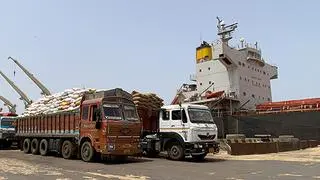From the time she assumed office on May 20 this year, the West Bengal Chief Minister, Ms Mamata Banerjee, has lost no opportunity to keep the electorate in good humour. Yet, her aspirations for ‘change' ( paribartan ) appear to be seriously constrained by a looming funds crisis which, if not addressed immediately by broad-spectrum tax and expenditure reforms — a proposition she is not comfortable with, to say the least — may have a telling impact on the treasury in the next couple of months.
Apparently, the Chief Minister holds the UPA government at the Centre, led by Trinamool's electoral ally, the Congress, responsible for her miseries, and has upped the ante for the desired ‘fiscal package' to bail out the State government. She has sought nearly Rs 40,000 crore, to be disbursed by the Centre mostly in the form of untied funds, over two years, to help her government meet the revenue shortfall and release the State from the ‘debt-trap'.
While it is yet to be seen how the Centre accommodates her tall demands, without triggering a wider political debate involving other States, Ms Banerjee's problems are clearly double-edged. During the two-and-a-half months in power, Ms Banerjee's government has been credited with a number of measures which, in all fairness, seem to be wanting in economic prudence.
The State power utilities were not allowed to recover rising input costs and are now mitigating a cash loss of nearly Rs 100 crore a month, partially through bank loans and partially by retaining the electricity duty and coal cess, amounting to approximately Rs 1,000 crore annually. The utilities collect such duties on behalf of the State.
As if that is not enough, the utilities were discouraged from submitting annual tariff petitions before the regulator to realise a fixed cost push during 2010-11, coupled with claims for realisation of accumulated dues (against cost push till 2009-10), amounting to nearly Rs 2,500 crore.
FAVOURING COMMONERS
Possibilities of broad spectrum tax or expenditure reforms to improve the State's extremely low tax revenue to Gross State Domestic Product (GSDP) ratio and reduce non-development expenditure, were ruled out. On the contrary, whenever there was an opportunity, like the recent LPG price hike, Ms Banerjee sacrificed State revenues “to reduce the burden on commoners”.
She seems resigned to allowing large-scale investment proposals, like a 1,600 MW power plant, to move away from West Bengal for want of land — thereby sacrificing scope for future growth as well as increase in tax revenue — but, ‘will not acquire any land for industry'.
Last but not the least, she had rolled out a number of administrative measures requiring additional expenditure, both in terms of matching grants towards capital costs and, more importantly, rising employee costs, through creation of posts.
This is over and above her promise to recruit nearly half a million school-teachers and policemen. A quick estimate suggests that Ms Banerjee's policies have impacted the revenue inflow by approximately Rs 1,100 crore (retention of coal cess and electricity duty by utilities and sacrificing tax on LPG), if not more, annually. To add to the problem, the recent decision to introduce electronic refund of VAT — though a welcome step — may impact the cash-flow in State treasury by nearly Rs 1,000 crore in the first year.
To meet the widening revenue gap, the State has already borrowed approximately Rs 10,000 crore from the market, nearly half of which has been used up by Ms Banerjee's two-month-old government, leaving a narrow borrowing limit of Rs 7,000 crore for the rest of 2011-12.
However, even this huge borrowed amount was not enough to either foot the alleged “Rs 3,500 crore of unpaid bills of the Left Front regime” or regularise payments against current government purchases. But that is hardly the beginning of Ms Banerjee's agony. The State government employees are expecting her to fork out nearly Rs 2,500 crore towards arrears against the last wage revision and award a few instalments of dearness allowance (DA) before the festive season beginning in the first week of October. If she awards even one DA instalment, of the four pending, coupled with the payment of wage arrears, the State treasury will be poorer by about Rs 4,000 crore.
It will be a nightmare for Ms Banerjee if she were to risk her popularity for prudence in public finance by imposing embargo on wage increase.
HARD CHOICES
While Ms Banerjee is pinning hopes on Central support to help her manage the unmanageable, there appears to be little choice for her but to introduce a stricter fiscal regime and measures to fuel industrial growth, especially by attracting large industrial investments, so as to enhance the State's wafer-thin tax base.
Any Central largesse may fall short of bringing in a lasting solution to the State's financial miseries, without reforms. It is a hard choice, especially for someone enjoying a ‘popular' mandate. However, the earlier she adopts it, the faster the State's economic recovery will be.








Comments
Comments have to be in English, and in full sentences. They cannot be abusive or personal. Please abide by our community guidelines for posting your comments.
We have migrated to a new commenting platform. If you are already a registered user of TheHindu Businessline and logged in, you may continue to engage with our articles. If you do not have an account please register and login to post comments. Users can access their older comments by logging into their accounts on Vuukle.